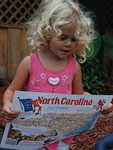North Carolina History+Technology
Question

Can you recommend some websites for NC history? I am specifically looking for PowerPoints, Prezis, etc. I am new to teaching this subject and am trying to use as much tech as possible.
Answer
First of all I would like to applaud your decision to integrate technology into your instruction; both you and your students will benefit from this pedagogical approach to learning. Becoming familiar with how content is delivered online is a good first step. The website, Learn NC offers a digital textbook that covers a standard course of North Carolina history. From there, you can branch out into more sophisticated, specialized sites as you become more familiar and comfortable with curricular content. In regards to presentation software such as PowerPoint or Prezi, many textbook companies offer online supplemental or supporting materials such as those you've requested. You can also find out more about these tools at Teachinghistory.org’s digital classroom feature. This entry on using Prezi in the classroom may be especially helpful.
What follows is a list of sites I've found to be particularly useful over the years, followed by a brief commentary on their contents:
- Learn NC: This site is a "one-stop shop" for North Carolina educators, providing everything from lesson plans to primary source documents. Under "Projects and Special Collections," choose "North Carolina History" for materials and ideas I think you'll find very useful.
- NC History Project and NC Pedia: These two sources provide quick, encyclopedic information for most topics covered in the North Carolina history curriculum. Additional features from both sources extend beyond that of a simple encyclopedia.
- The Way We Lived in North Carolina: This site provides an excellent chronological overview of North Carolina's past. Site contents are divided into time periods, which feature multiple hypertext links, affording opportunities for extended learning.
- NC Historic Sites: North Carolina Historic Sites offers information about some of North Carolina's most notable historic places of interest. The site provides access to features such as virtual tours, topographical maps, and information about artifacts like those found at Town Creek Indian Mound.
- NC Digital Collections: This site is a repository of digitized primary source documents from the North Carolina State Archives and State Library of North Carolina. (Also available online here)
- NC State Archives' Photostream: This is a set of historic North Carolina photographs and images maintained on a Flickr page. The collections are thematically organized and offer a broad visual overview of North Carolina history.
- Duke Digital Collection, NC State Digital Collection, East Carolina Digital Collection, UNC Digital Collection: These four North Carolina university websites each offer access to valuable collections focused on a wide range of historical topics.
- Documenting the American South: This collection offers access to the University of North Carolina libraries' extensive digital collection of Southern artifacts.
- Digital Library of Appalachia and Western NC Heritage: These two online resources provide users with materials representative of North Carolina's mountain heritage.
- Plantation Letters: This collection of correspondences from the Cameron family offers insight into the history of the Antebellum South and includes lesson plans and other online activities.
- Digital History and Pedagogy Project: Although not specific to North Carolina, this site, maintained by Professor John Lee, offers great ideas, possibilities, and frameworks for engaging students in digital history.
Other sites worth mentioning for their compilations of useful teaching resources include:
- NC Department of Cultural Resources
- NC Office of Archives and History
- NC Educational Resources via NC History Museum
- NC Exploring Cultural Heritage Online
- Teaching with Primary Sources from Mars Hill College
Once you've developed a certain comfort level with the curriculum, I think you'll discover your own areas of content interest and not only expand beyond these recommendations, but also identify your favorite sites.
